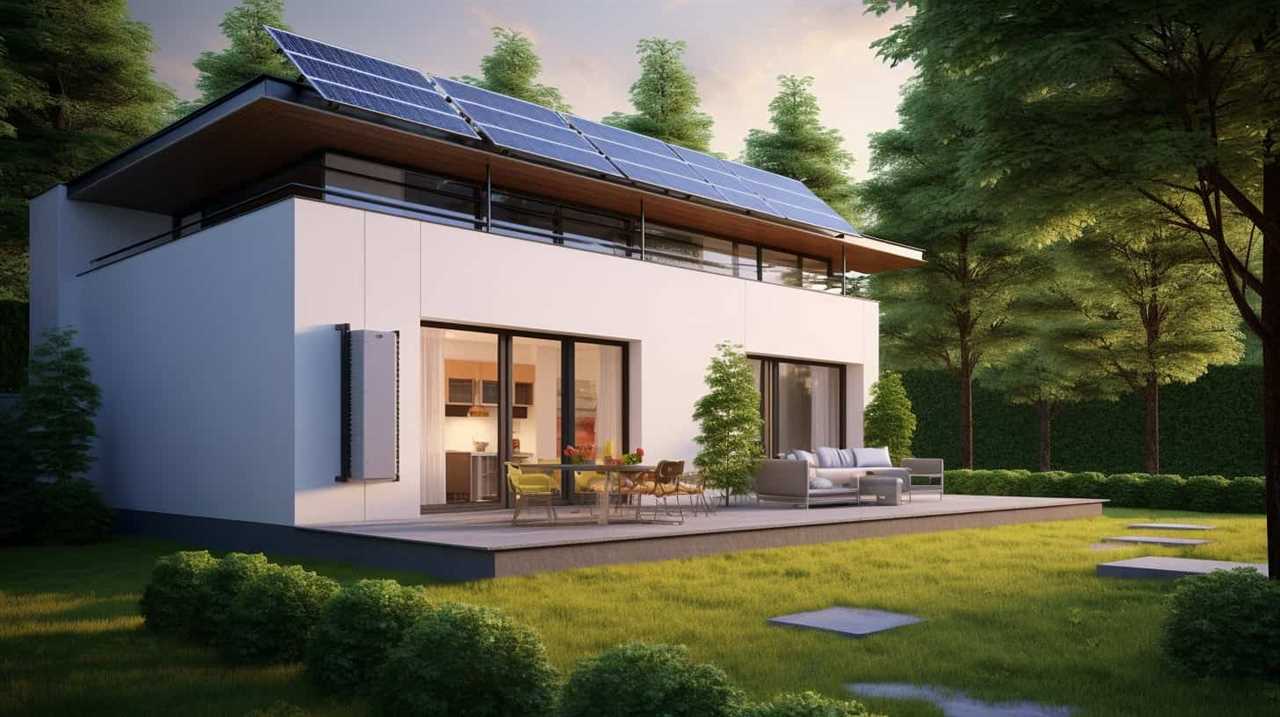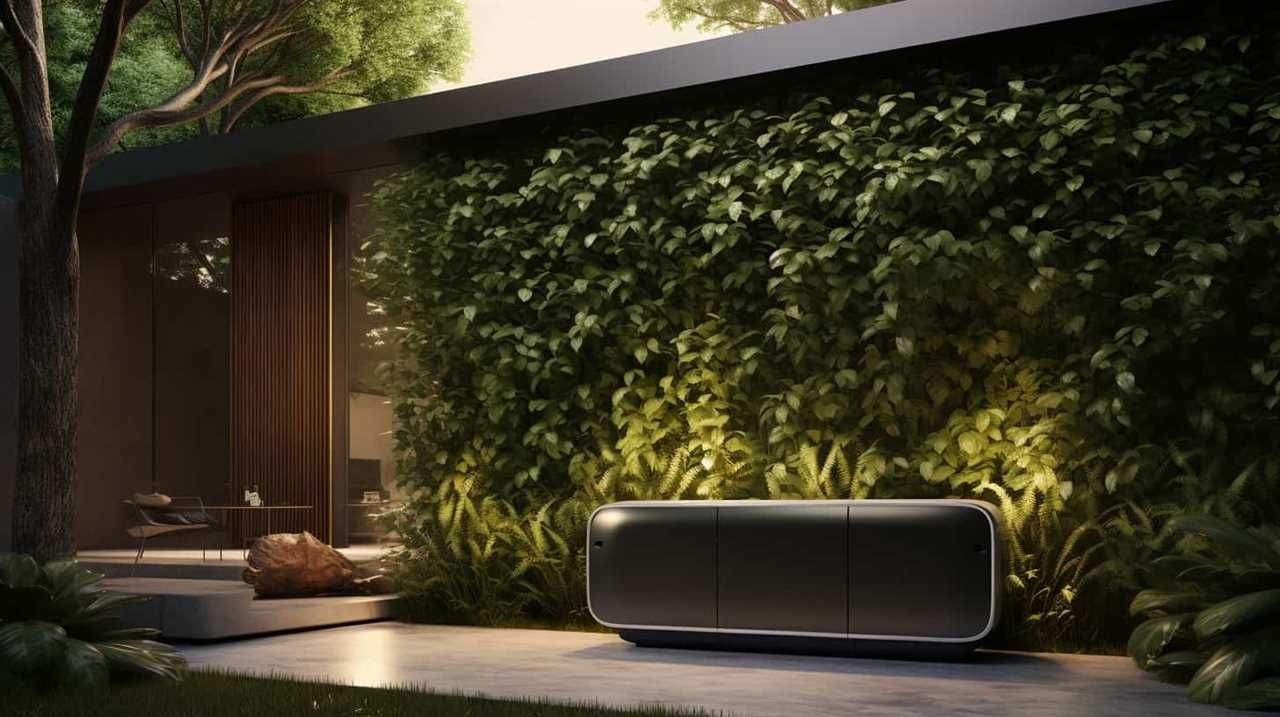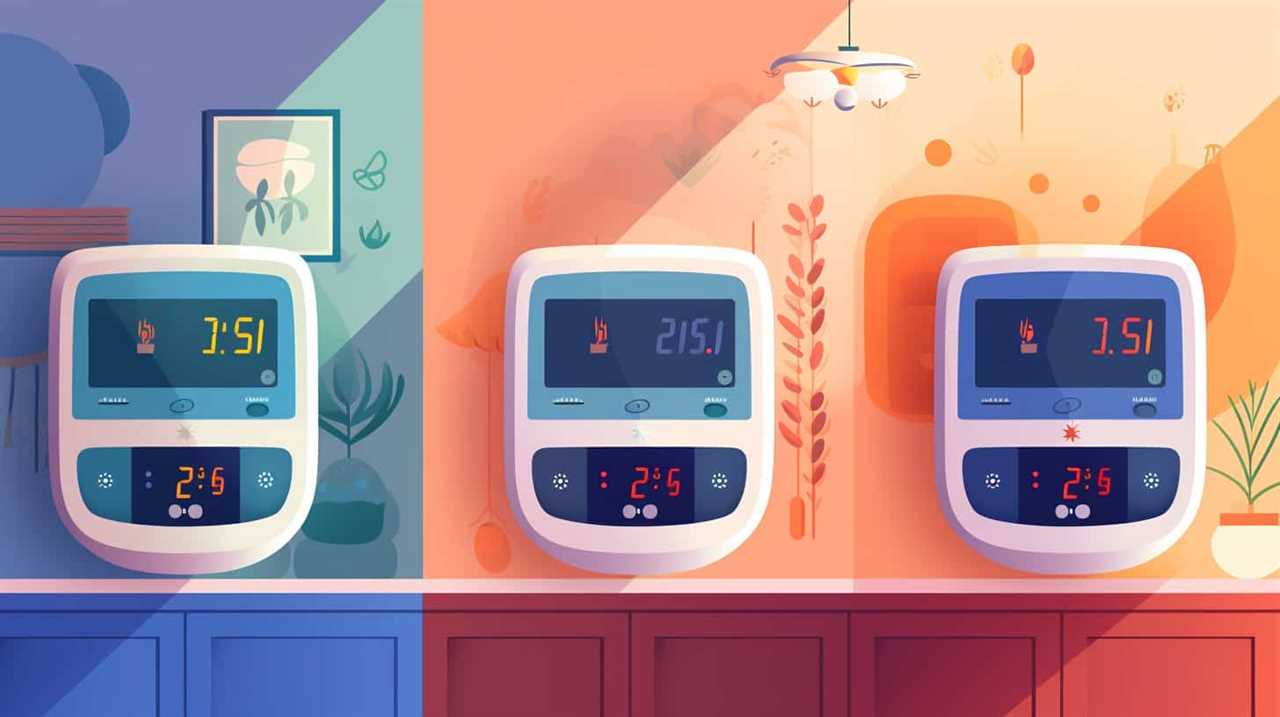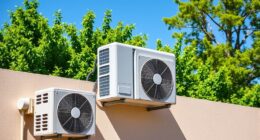When it comes to heating and cooling our homes, it’s important to remember the age-old adage “work smarter, not harder.”
Introducing affordable and efficient heat pump HVAC systems. These systems are designed to provide optimal comfort while minimizing energy consumption.
In this article, we’ll explain how heat pump systems work, the factors to consider when choosing one, and provide installation and maintenance tips.
Get ready to liberate your home with cost-effective heating and cooling solutions.

Key Takeaways
- Heat pumps transfer heat instead of generating it, resulting in less energy consumption.
- Heat pumps can save up to 30-40% on energy bills compared to traditional systems.
- Accurately calculate the heating and cooling loads of your home to select the right size heat pump.
- Regular maintenance and cleaning of heat pumps are essential for optimal performance and efficiency.
The Basics of Heat Pump HVAC Systems
Let’s start by understanding how heat pump HVAC systems work.
Heat pump technology is an innovative way to heat and cool your home or building efficiently. Unlike traditional HVAC systems that generate heat or cool air, heat pumps transfer heat from one place to another. They use refrigerant to absorb heat from the outdoor air or ground and then distribute it indoors during the colder months. In the summer, they reverse the process, extracting heat from the indoor air and releasing it outside.
This method of heating and cooling offers several benefits. Firstly, it’s highly energy-efficient, as it doesn’t rely on the combustion of fossil fuels. Secondly, it provides consistent and even temperatures throughout the space. Lastly, heat pumps can also dehumidify and filter the air, improving indoor air quality.
Understanding the Energy Efficiency of Heat Pumps
Our goal is to understand the energy efficiency of heat pumps and how they can help us save on utility costs. Heat pump technology offers several benefits that make it an efficient and cost-effective choice for heating and cooling our homes.

Here are some key points to consider:
-
Energy-efficient operation:
-
Heat pumps transfer heat from one place to another, rather than generating it, resulting in less energy consumption.
-
They can provide up to four times the amount of energy they consume, making them highly efficient.

-
Lower utility costs:
-
By utilizing less energy, heat pumps can significantly reduce our heating and cooling expenses.
-
They can help us save up to 30-40% on our energy bills compared to traditional heating and cooling systems.
Understanding the energy efficiency of heat pumps is essential in making informed decisions about our HVAC systems. Heat pump technology provides us with an efficient and cost-effective solution that can help us save money while enjoying a comfortable indoor environment.

Factors to Consider When Choosing a Cost-Effective Heat Pump
There are three key factors to consider when choosing a cost-effective heat pump for our HVAC system.
The first factor is determining the appropriate heat pump size for our space. An undersized heat pump will struggle to provide adequate heating or cooling, while an oversized one will consume unnecessary energy. It’s essential to calculate the heating and cooling loads of our home accurately to select the right size.
The second factor to consider is heat pump rebates. Many utility companies and government agencies offer rebates and incentives for installing energy-efficient heat pumps. These rebates can significantly reduce the upfront cost of the system, making it more cost-effective in the long run.
Lastly, we should consider the maintenance and installation costs. Opting for a heat pump that’s easy to install and maintain can save us money in the long term.

Considering these factors will help us choose a cost-effective heat pump for our HVAC system.
Now, let’s move on to the next section, which provides installation and maintenance tips for affordable heat pump systems.
Installation and Maintenance Tips for Affordable Heat Pump Systems
When it comes to installing and maintaining affordable heat pump systems, it’s important to follow these tips for optimal performance and cost-effectiveness:
-
Choose the right size: Ensure the heat pump is sized correctly for your space to avoid energy wastage and inefficiency.

-
Regularly clean and replace filters: Dirty filters can impede airflow and reduce the heat pump’s efficiency. Clean or replace them every one to three months.
-
Keep the outdoor unit clean: Clear debris, leaves, and dirt from the outdoor unit regularly to prevent airflow blockage.
-
Check and seal ductwork: Leaky ducts can lead to significant energy loss. Inspect and seal any leaks to maximize the heat pump’s efficiency.
-
Schedule annual maintenance: Professional maintenance can identify and address any issues before they become major problems, ensuring your heat pump operates at its best.

Comparing the Cost Savings of Heat Pump HVAC Systems
Comparing the cost savings of heat pump HVAC systems involves analyzing the potential energy and financial benefits of utilizing these efficient systems. When comparing heat pump systems to traditional HVAC systems, it becomes clear that heat pumps offer significant long-term savings. Not only do heat pumps provide efficient heating and cooling, but they also operate using less energy than traditional systems. This translates into lower utility bills and reduced environmental impact. To illustrate the cost savings, consider the following table:
| Cost Comparison | Heat Pump HVAC Systems | Traditional HVAC Systems |
|---|---|---|
| Initial Investment | Higher | Lower |
| Energy Efficiency | Higher | Lower |
| Operating Costs | Lower | Higher |
As shown in the table, while heat pump systems may have a higher initial investment, their energy efficiency and lower operating costs result in significant long-term savings. This makes heat pump HVAC systems the ideal choice for individuals seeking both financial and environmental liberation.
Frequently Asked Questions
How Long Do Heat Pump HVAC Systems Typically Last?
Heat pump HVAC systems typically last for 15-20 years with proper maintenance. Their longevity benefits include energy efficiency and cost savings. Regular maintenance, such as cleaning filters and checking refrigerant levels, is necessary to ensure optimal performance.
Can Heat Pump Systems Be Used in Cold Climates?
Yes, heat pump systems can be used in cold climates. The efficiency of heat pump systems allows them to extract heat even at low temperatures, providing cost-effective heating and cooling solutions in cold regions.

Are There Any Tax Credits or Incentives Available for Installing a Heat Pump HVAC System?
Tax credit eligibility and financial benefits are available for installing a heat pump HVAC system. These incentives can help offset the initial cost and provide long-term savings.
How Noisy Are Heat Pump Systems Compared to Traditional HVAC Systems?
Heat pump systems are generally quieter than traditional HVAC systems. They provide efficient heating and cooling by transferring heat instead of creating it. This reduces noise levels and increases energy efficiency, making them a popular choice for homeowners.
Can a Heat Pump System Be Used for Both Heating and Cooling Purposes?
Yes, a heat pump system can be used for both heating and cooling purposes. Heat pump system efficiency is one of the advantages of these systems in residential buildings, providing cost-effective and versatile temperature control.
Conclusion
In conclusion, heat pump HVAC systems are the epitome of affordable and efficient technology. They not only keep us cozy in the winter and cool in the summer, but they also save us a fortune on energy bills.

With their mind-blowing efficiency and cost-effectiveness, it’s like having a money-printing machine in our homes.
So, if you want to live in a perpetual state of comfort and financial bliss, jump on the heat pump bandwagon and watch your bank account grow!









